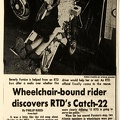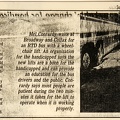Denver Post
[Headline] RTD Cries Foul Over 'Stuck' Rider
Photo to right of article, Denver Post photo by Ken Bisio: A woman [Beverly Furnice] who is in a motorized wheelchair with her long legs extended straight in front of her, is framed by the front door of a bus. She has her left arm up above her face, as if to protect herself and she has a wary expression on her face. Behind her a large man in shirt sleeves and a tie is holding her wheelchair's push handles and appears to be trying to maneuver her off the bus. There does not appear to be a lift deployed. Part of the universal access symbol is visible next to the door of the bus.
Caption reads: Beverly Furnice is helped off an RTD bus. She wound up on a long ride.
By BRAD MARTISIUS
Denver Post Staff Writer
In the 1960s, the Kingston Trio recorded a song about a man trapped on the MTA, doomed to ride forever in the Boston subway.
That song seemed prophetic Thursday when a handicapped woman found herself unable to get off an Regional Transportation District bus and ended up seeing much of Denver before finally being assisted off by RTD officials, anxious to avoid a scene.
The incident, however, raised the hackles of RTD officials, who felt they were the victims of a ploy by members of the Atlantis Community, 4536 E. Colfax Ave., an organization that aids the handicapped. And Wade Blank, co-director of the Atlantis Community, said he wasn't too happy with RTD substituting one type of RTD lift-bus for another type, leading to a very long ride for the handicapped woman.
THE WOMAN, Beverly Furnice, 43, of 1135 Josephine St., has legs which are rigid perpendicular to her body and don't bend because of her condition. This makes it impossible for her to ride in an automobile or taxi, a problem exacerbated by the fact that her wheelchair weighs 400 pounds and doesn't fold. Blank said she rides the bus to work daily, and usually has no problems.
However, he said RTD put a different bus on the route Thursday. Asked why Miss Furnice didn't just wait for the next bus, Blank said the special buses on that route run only every two hours.
Miss Furnice’s wheelchair is elevated and is longer than many wheelchairs, and was unable to negotiate the bus‘ interior without help, even though the bus was equipped with a ramp to aid handicapped persons in boarding. When she got on the bus, she was aided by Atlantis Community members.
But when the time came for her to get off, there was no one to help, and the busdriver, who wouldn't identify himself, refused to leave his driver’s seat, so she had no choice but to continue riding the bus, taking the circuit out to Red Rocks and back.
ACCORDING TO Dick Thomas, executive director for RTD‘s department of program management, the driver was assured that help would be available for Miss Furnice when she got off the bus. He said the driver made it clear when she boarded that he wouldn't help her get off.
“The drivers have the right to do that," Thomas explained. “It’s in their union contract, and it's there to protect the other passengers. It’s up to the driver's discretion. He can help, but he doesn't have to if he feels it would be hazardous to leave the driver's seat."
Thomas said Blank boarded the bus at Miss Furnice's stop and argued with the bus driver, but refused to help her get off the bus. About two hours later, several wheelchair-bound persons from the community were waiting at Miss Furnice’s stop, with the intention of boarding the bus also and riding in sympathy with her.
Blank said Friday that the bus incident wasn't a planned protest, but that the wrong bus had arrived at least three times before and that this time Atlantis community decided to make a point about the type of bus used “which was bought without our permission."
Blank said RTD frequently replaces one type of lift-bus with other, less accessible types, creating potential problems. “We've asked RTD not to use the less-accessible buses, for just this reason," Blank said. “It's not a problem if the driver is sensitive to the needs of the handicapped."
Thomas said the lift-buses, while designed to meet some of the needs of the handicapped, never will be able to meet all the needs of everyone. He said there always will be some handicapped who just won’t be able to use them.
- Created on
- Wednesday 10 July 2013
- Posted on
- Tuesday 10 May 2016
- Tags
- accessible, Atlantis Community, Beverly Furnice, boarding/deboarding, Wade Blank, wheelchair lifts
- Albums
- Visits
- 2151
- Rating score
- no rate
- Rate this photo


0 comments